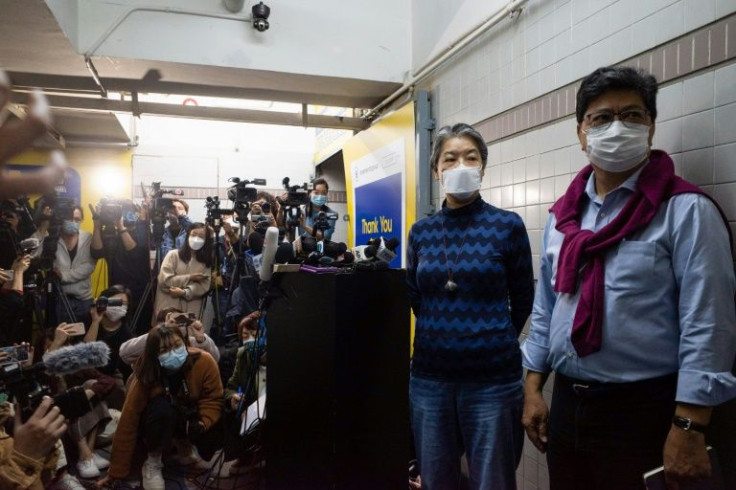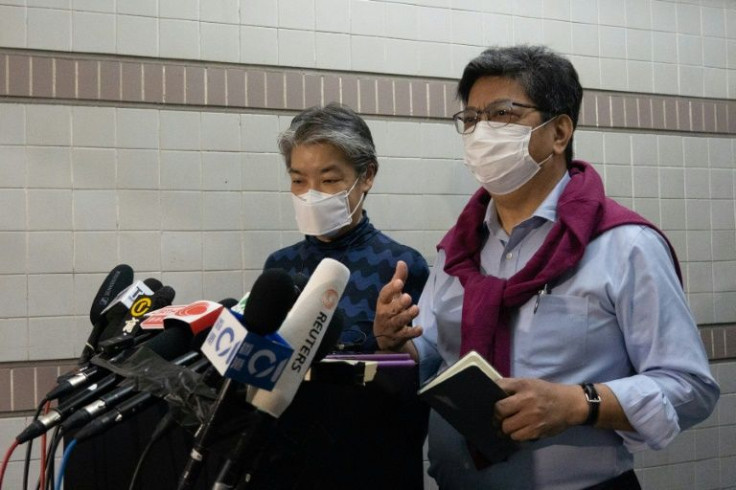Third Hong Kong News Company Shutters As Media Fears Grow
Journalists from Hong Kong's CitizenNews decried plummeting press freedoms as they shut down Monday, saying they no longer felt safe to publish after a rival outlet's staff were arrested for "sedition".
One of the most popular news websites in Hong Kong with more than 800,000 social media followers, CitizenNews is the third media company to stop publishing as Beijing oversees a sweeping crackdown on dissent.
The crowdfunded non-partisan platform, founded in 2017 by a group of veteran journalists, made its shock closure announcement on Sunday evening and said its website would stop updating from midnight Tuesday.

On their final day, reporters made clear their decision was fuelled by fears caused by a national security police raid last week on Stand News.
"We have been trying our best not to violate any laws but we can no longer see clearly the lines of law enforcement and we can no longer feel safe to work," CitizenNews co-founder Chris Yeung, a former president of the Hong Kong Journalists Association, told reporters.
"Journalists are also human beings with families and friends," he added.

Yeung said their newsroom had not been contacted by law enforcement but that they decided to close based on what they saw was happening to the media.
"Can we work on some 'safe news'? I don't even know what is 'safe news'," chief editor Daisy Li, also a former HKJA president, told reporters.
As they were speaking, lawmakers in Hong Kong's new "patriots only" legislature were swearing oaths of allegiance following a new selection process that barred the traditional democracy opposition and saw most candidates chosen by pro-Beijing committees.
Last week 89 of the 90 new lawmakers issued a joint statement welcoming the Stand News raid and arrests.

China's state-affiliated Global Times welcomed the closure of CitizenNews on Monday.
"Similar to Stand News, it also published articles harshly criticising the central government and also the Communist Party of China," the paper wrote.
Hong Kong had long been a regional and international media hub, even as the city's press freedom ranking steadily slipped over the last decade.
But in the last 18 months, unprecedented changes have swept through the industry, primarily targeting local press.
Outspoken tabloid Apple Daily collapsed last year after its assets were frozen and key leaders arrested under a new national security law over the content it published.
Stand News closed last week after seven current and former members were arrested for their reporting.
The company, its co-founder Chung Pui-kuen and last chief editor Patrick Lam were charged with "conspiracy to publish seditious publications". Both journalists were denied bail.
With a few exceptions, remaining local outlets have increasingly toed the official line while new government appointees have turned public broadcaster RTHK into something more closely resembling China's state media.
Over the weekend Yonden Lhatoo, chief news editor of the South China Morning Post, described Western criticism of failing press freedoms in Hong Kong as "morally bankrupt" because Wikileaks founder Julian Assange remains in a British jail awaiting extradition to the US.
"Flush your own faeces first before you lecture us on sanitation," he said.
Human and media rights groups like Amnesty International, Reporters Without Borders and the International Federation of Journalists have called for Assange to be released.
Others such as The New York Times and The Washington Post moved to or opened new Asia offices in South Korea because of the political situation in Hong Kong.
Last month, the Hong Kong government threatened legal action against The Wall Street Journal and the Financial Times for editorials critical of government policy.
In its latest letter to the WSJ responding to an editorial last week titled "No One Is Safe In Hong Kong", Chief Secretary John Lee accused the newspaper of making "baseless allegations" and said the Stand News arrests had "nothing to do with the freedom of the press".
© Copyright AFP 2024. All rights reserved.




















